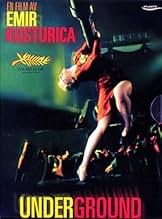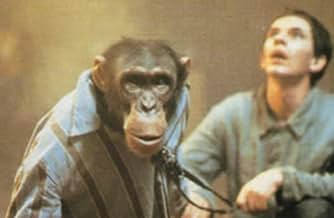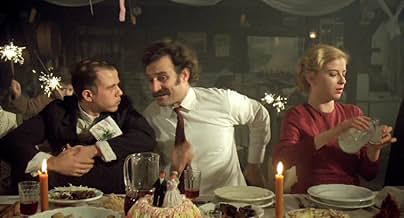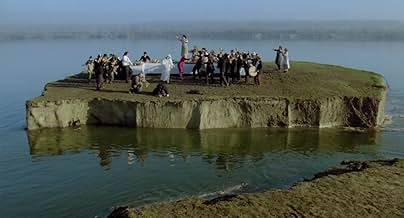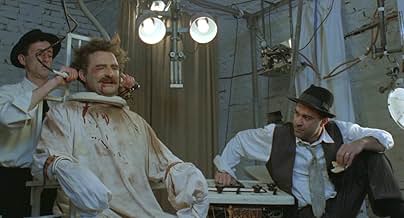AVALIAÇÃO DA IMDb
8,0/10
63 mil
SUA AVALIAÇÃO
Um grupo de socialistas sérvios se prepara para a guerra em um porão surreal cheio de festas, tragédias, amor e ódio.Um grupo de socialistas sérvios se prepara para a guerra em um porão surreal cheio de festas, tragédias, amor e ódio.Um grupo de socialistas sérvios se prepara para a guerra em um porão surreal cheio de festas, tragédias, amor e ódio.
- Direção
- Roteiristas
- Artistas
- Prêmios
- 8 vitórias e 11 indicações no total
Predrag 'Miki' Manojlovic
- Marko
- (as Miki Manojlovic)
- …
Srdjan 'Zika' Todorovic
- Jovan
- (as Srdjan Todorovic)
Danilo 'Bata' Stojkovic
- Deda
- (as Bata Stojkovic)
Nele Karajlic
- Falling Gypsy
- (as Dr. Nele Karajlic)
Avaliações em destaque
10pickle-7
I rarely weep during movies. At the end of this film, however, I began to weep bitterly--not because I was saddened by the story (although it is sad), but because I knew that I could never hope to create anything as beautiful as the movie I had just watched. It is this sort of film that both inspires and frightens aspiring film makers.
Comical, chaotic, patriotic, satirical, philosophical, questioning, critical, ironic and many other things, throughout the plot we perceive the different layers of the plot, which in turn, requires a certain abstraction from those who watch, because in general, the characters and lived situations are just abstractions or representations.
Divided into three acts, it tells the story from the beginning to the end of Yugoslavia, through WWII, the Cold War and the dissolution of the country. We have four characters, and here, I'm going to talk a little bit about what each one represents, according to what I understand.
Crni: The Partizans, who truly love the country, fight and die for it.
Natalija: Yugoslavia itself, which at a certain moment is with Germany represented by the Official, at a certain moment with the Rebels, and a good part with the Politicians.
Marko: The corrupt, politicians, generals who, in order to stay in power, commit the greatest atrocities and betray the trust of even their brothers, friends and family.
Ivan: The Yugoslav people, who, don't understand what's happening when the war starts, much less when the war ends and Yugoslavia ends. Perhaps symbolized as on crutches, due to the country's institutional fragility.
In the first act, we have the second world war, where Natalija has love for the first three characters (Crni and German Officer, Marko), representing, the passage of domination throughout history, Crni at one point tries to date Natalija, but who does date her? Is the officer, and after the war with the Allied victory ends up staying with Marko. Also, we have a memorable scene of Ivan hitting the officer and saying, "You think you're going to have her, you filthy pig."
In the second act, we have the cold war and also the longest act of the film, I believe due to the long 40 years of the period. Right now we have The characters trapped living in a basement forced to build weapons, living under sub-human conditions, which to me means, the curtain of communism in relation to capitalism. The guns, it represents, perhaps the arms race. Marko, the politician/general who profits and lives very well from this arms trade (portrayed in Lord of War) while leaving the people living in fear of enemy domination, closed to the world that exists beyond the basement.
In the last act, we have Ivan, totally weakened from having lived through so many wars, who discovers he is being deceived all the time about the basement and the lies told as a form of control, coming across the capitalist world for the first time, having a shock to discover that your country no longer exists. In fact, the doctor who talks to him, perhaps represents NATO.
The most interesting thing for me is that the film does not seek to point out right and wrong, villains and heroes, only to portray the facts in a raw and comic way.
Anyway, I hope that my interpretation of what this film tries to tell will help other cinephiles. I'm Brazilian so I may have misunderstood the film if that's the case forgive me, I did a quick read about Yugoslav history to write this review.
Divided into three acts, it tells the story from the beginning to the end of Yugoslavia, through WWII, the Cold War and the dissolution of the country. We have four characters, and here, I'm going to talk a little bit about what each one represents, according to what I understand.
Crni: The Partizans, who truly love the country, fight and die for it.
Natalija: Yugoslavia itself, which at a certain moment is with Germany represented by the Official, at a certain moment with the Rebels, and a good part with the Politicians.
Marko: The corrupt, politicians, generals who, in order to stay in power, commit the greatest atrocities and betray the trust of even their brothers, friends and family.
Ivan: The Yugoslav people, who, don't understand what's happening when the war starts, much less when the war ends and Yugoslavia ends. Perhaps symbolized as on crutches, due to the country's institutional fragility.
In the first act, we have the second world war, where Natalija has love for the first three characters (Crni and German Officer, Marko), representing, the passage of domination throughout history, Crni at one point tries to date Natalija, but who does date her? Is the officer, and after the war with the Allied victory ends up staying with Marko. Also, we have a memorable scene of Ivan hitting the officer and saying, "You think you're going to have her, you filthy pig."
In the second act, we have the cold war and also the longest act of the film, I believe due to the long 40 years of the period. Right now we have The characters trapped living in a basement forced to build weapons, living under sub-human conditions, which to me means, the curtain of communism in relation to capitalism. The guns, it represents, perhaps the arms race. Marko, the politician/general who profits and lives very well from this arms trade (portrayed in Lord of War) while leaving the people living in fear of enemy domination, closed to the world that exists beyond the basement.
In the last act, we have Ivan, totally weakened from having lived through so many wars, who discovers he is being deceived all the time about the basement and the lies told as a form of control, coming across the capitalist world for the first time, having a shock to discover that your country no longer exists. In fact, the doctor who talks to him, perhaps represents NATO.
The most interesting thing for me is that the film does not seek to point out right and wrong, villains and heroes, only to portray the facts in a raw and comic way.
Anyway, I hope that my interpretation of what this film tries to tell will help other cinephiles. I'm Brazilian so I may have misunderstood the film if that's the case forgive me, I did a quick read about Yugoslav history to write this review.
If you get a chance to see this projected on a sheet in an unheated high school gym with hard chairs and flat Pepsi, DON'T MISS IT. You can get a VHS copy--DO IT. (Unfortunately, there's no DVD ... YET, right, New Yorker Films?) I walked into an art house theatre in Nashville, Tennessee, no reviews, no word of mouth, just this poster of a woman wearing a red dress, her arms wrapped around the barrel of a tank's cannon. I came out one second (or was it two and half hours?) later a different person. People and movies are imperfect things--this one is messy, joyous, horrific, ecstatic, beat, danceable, romantic, provocative, drunk--this movie tastes like Slivovitz and sounds like Heaven's carnival. And there's a monkey. Once there was a country ...
Those who have seen "Underground" have probably noticed that we are not watching one film but a collection of at least 10 films in one single masterpiece!!
I watched with great enthusiasm the work of Kusturica after "Underground" in films like "Arizona Dream" or "Black Cat White Cat" films which prove to be more elaborate and "smoother" in terms of direction (brilliant works as well!!) but none of these films could ever equal the "nerve" and strength of a very young Kusturica at his best! One could see the passion and boldness that is at stake in this motion picture. It's as if he gambled his own life doing "Underground"
How else can you describe this work of art if not a mixture of devilish and holy images that take the shape of a flawless piece of theater-dance!!
The actors speak, dance and create (more than interpret) with a vigor rarely found outside the Balkan Circle!
In terms of theatrical aesthetics the film incorporates Stanislavski( realism at its best), Brecht (at certain points the actors step out of their roles and mock at themselves) and Artaud (they are flames more than humans)
Needless to say more!
Shocking, raw, heart-breaking!!
One of the most beautiful I have ever seen! 10/10
I watched with great enthusiasm the work of Kusturica after "Underground" in films like "Arizona Dream" or "Black Cat White Cat" films which prove to be more elaborate and "smoother" in terms of direction (brilliant works as well!!) but none of these films could ever equal the "nerve" and strength of a very young Kusturica at his best! One could see the passion and boldness that is at stake in this motion picture. It's as if he gambled his own life doing "Underground"
How else can you describe this work of art if not a mixture of devilish and holy images that take the shape of a flawless piece of theater-dance!!
The actors speak, dance and create (more than interpret) with a vigor rarely found outside the Balkan Circle!
In terms of theatrical aesthetics the film incorporates Stanislavski( realism at its best), Brecht (at certain points the actors step out of their roles and mock at themselves) and Artaud (they are flames more than humans)
Needless to say more!
Shocking, raw, heart-breaking!!
One of the most beautiful I have ever seen! 10/10
10inframan
When I first saw this movie on the indie channel, I taped it. I immediately watched it again, totally stunned by the extent of energy, imagination, ideas, images with which I was being blasted. Talk about a universal masterpiece! This movie should be required viewing on every screen, large & small in the US. We Americans lead such narrow sheltered lives; we are so eager to see things in black & white, to have our opinions dictated by columnists & newscasters. This movie should take off a few blinders. On the other hand, people will still opt for easy cartoon ideologies over the indisputable truth about the ferocious & predatory predilections of all "sides" of humanity. Thank god for visionary humorists like Kusturica.
Você sabia?
- CuriosidadesThe director's cut ran for over 320 minutes.
- Versões alternativasThere is a 300 minutes version of this film produced for television.
- ConexõesFeatured in Cannes... les 400 coups (1997)
Principais escolhas
Faça login para avaliar e ver a lista de recomendações personalizadas
- How long is Underground?Fornecido pela Alexa
Detalhes
- Data de lançamento
- Países de origem
- Idiomas
- Também conhecido como
- Underground
- Locações de filme
- Plovdiv, Bulgária(Tunels)
- Empresas de produção
- Consulte mais créditos da empresa na IMDbPro
Bilheteria
- Orçamento
- US$ 14.000.000 (estimativa)
- Faturamento bruto nos EUA e Canadá
- US$ 171.082
- Faturamento bruto mundial
- US$ 182.134
- Tempo de duração2 horas 50 minutos
- Cor
- Mixagem de som
- Proporção
- 1.85 : 1
Contribua para esta página
Sugerir uma alteração ou adicionar conteúdo ausente

Principal brecha
What was the official certification given to Underground: Mentiras de Guerra (1995) in Brazil?
Responda

